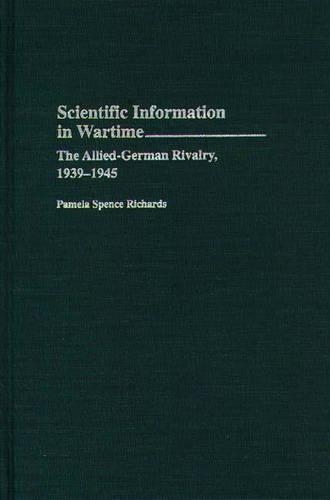
Scientific Information in Wartime: The Allied-German Rivalry, 1939-1945
(Hardback)
Publishing Details
Scientific Information in Wartime: The Allied-German Rivalry, 1939-1945
Bloomsbury Publishing PLC
Praeger Publishers Inc
14th June 1994
United States
Classifications
Tertiary Education
Non Fiction
History of science
History: specific events and topics
355.02
Physical Properties
Hardback
192
Width 156mm, Height 235mm
454g
Description
This book describes how the growing awareness of the strategic importance of science in the 1930s caused the Allied and German leadership to build scientific information supply systems that survived into the postwar era. Using archival materials from five countries, Richards traces the successes and failures of these early scientific intelligence agencies. She focuses on the OSS unit supplying copy for the US government's wartime program to reprint current German scientific journals. She describes as well the methods used by the OSS to spirit individual journal issues from inside the Reich to microfilm squads on Germany's periphery, and gives special attention to the Allied quest for information about the mythical German atomic bomb. Richards also describes the supply system set up by the Nazi government, and how its increasing desperation for Allied scientific news led in the last year of the war to a submarine landing of Abwehr agents on the U.S. coast to microfilm periodicals at the New York Public Library. The final chapter of her book looks at how the wartime experience with scientific information influenced postwar patterns of scientific documentation and librarianship in each country.
Reviews
A well-researched and well-organized book.-Journal of the American Society for Information Science
Of great interest for upper-division undergraduate, graduate, and specialist collections.-Choice
This slim volume contains a wealth of detail about the information sypply systems used by Germany, the United States, and Great Britain during the period of World War II, to insure that their scientists would get the scientific and technical information they needed, especially in support of the war effort. History such as this is important for the student in library and information science courses and of interest to the general reader as well.-Libraries and Culture
A well-researched and well-organized book.Journal of the American Society for Information Science
"A well-researched and well-organized book."-Journal of the American Society for Information Science
"Of great interest for upper-division undergraduate, graduate, and specialist collections."-Choice
"This slim volume contains a wealth of detail about the information sypply systems used by Germany, the United States, and Great Britain during the period of World War II, to insure that their scientists would get the scientific and technical information they needed, especially in support of the war effort. History such as this is important for the student in library and information science courses and of interest to the general reader as well."-Libraries and Culture
Author Bio
PAMELA SPENCE RICHARDS is Professor of Library and Information Studies at Rutgers University. The author of four books, she has had many articles published in German and English journals and has lectured widely in both countries.
